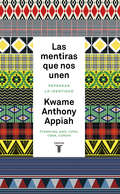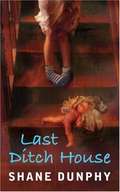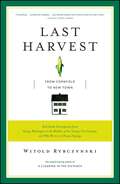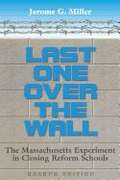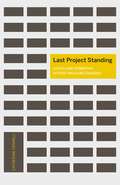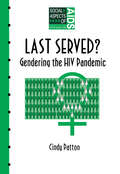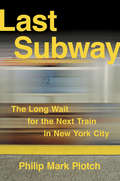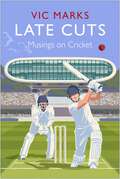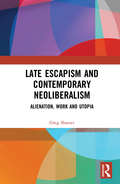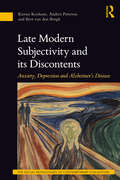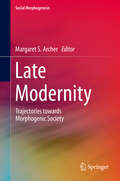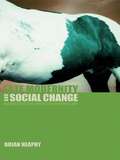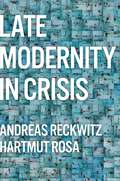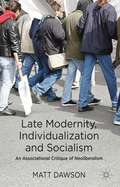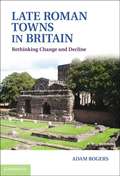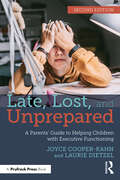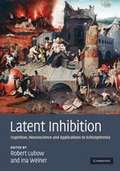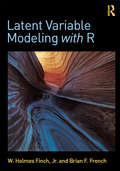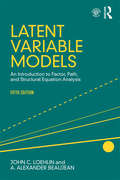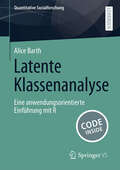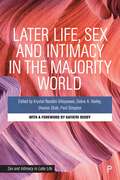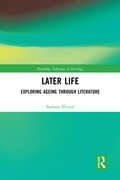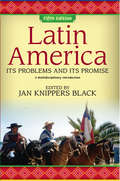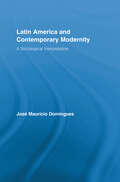- Table View
- List View
Las mentiras que nos unen: Replanteando la identidad
by Kwame Anthony AppiahUn poderoso manifiesto contra la guerra de identidades, por uno de los más lúcidos pensadores contemporáneos. «Breve pero poderoso. Appiah desmantela elegantemente la farsa, el dogma y la propaganda que persisten en nuestros intentos de discutir la "identidad". Inspirador e imprescindible.»Zadie Smith Género, religión, raza, nacionalidad, clase y cultura. Estos conceptos nos definen y moldean nuestro mundo polarizado. Sin embargo, las identidades colectivas que generan están plagadas de contradicciones y falsedades. Al explorar su naturaleza y su historia -desde las engañosas ideas sobre la raza del XIX hasta los debates contemporáneos sobre «apropiación cultural»- Kwame Anthony Appiah se deshace de los mitos más venenosos y desmonta con lucidez nuestras ideas preconcebidas sobre cómo funcionan estas identidades. Todos sabemos que las identidades crean conflictos, pero Appiah revela cómo las identidades nacen del conflicto. Y demuestra también, entrelazando lúcidos argumentos, maravillosos ejemplos históricos y anécdotas personales en una narración vibrante, que nuestro preciado concepto de soberanía nacional es incoherente; que la idea misma de la cultura occidental es un espejismo deslumbrante; y, en definitiva, que no existe una esencia asociada a una determinada identidad social que explique por qué las personas son como son. Appiah, filósofo ghanés de madre inglesa y padre perteneciente a la etnia asante, está en una posición idónea para reflexionar sobre cosmopolitismo, pertenencia e identidad. Su libro es un manifiesto filosófico para el siglo XXI. La crítica ha dicho...«Inteligente y sutil, ligero y a la vez lleno de apreciaciones perspicaces.»Daniel Gascón, Letras Libres «Necesitamos más pensadores tan sabios como Appiah.»Anand Giridharadas, The New York Times Book Review (portada) «Las principales identidades de las culturas contemporáneas pueden ser erróneas. Hay mucho que aprender de esta espléndida obra.»Amartya Sen, premio Nobel de Economía «Excelente. Aunque la solución a la fractura de nuestro mundo sea inalcanzable, al menos este libro nos ayuda a ver con claridad el problema.»Clifford Thompson, The Washington Post «La tesis de este entretenido y serpenteante viaje es que las identidades son menos sólidas de lo que se suele pensar.»The Economist «Appiah nos invita a ceder ante la difícil tarea de vivir con complejidad, es decir, de ser modernos. Erudito, personal, oportuno y profundamente humano. Un libro para nuestro tiempo.»Arlie Russell Hochschild «Escritor elegante y pensador trascendente, Anthony Appiah revela la manipulación histórica de los estereotipos de color y raza. Nos conduce a replantearnos a qué tribu pertenecemos. Una genialidad y una lectura placentera.»Mary Karr, autora de El club de los mentirosos e Iluminada «Uno de los más relevantes escritores en temas como la identidad, la cultura y la diferencia. Con su marca registrada, sinónimo de claridad, elegancia y rigor, es un guía muy útil para pensar en algunos de los complicados problemas relacionados con quiénes somos y qué podemos ser.»Viet Thanh Nguyen, ganador del premio Pulitzer por El simpatizante
Last Call for Liberty: How America's Genius for Freedom Has Become Its Greatest Threat
by Os GuinnessThe hour is critical. The American republic is suffering its gravest crisis since the Civil War.
Last Ditch House
by Shane DunphyThe cases recounted here by the author-- a child protection worker, are those of four children from very different aspects of Irish society, each with a unique story to tell.
Last Harvest: From Cornfield to New Town
by Witold RybczynskiIn Last Harvest, the award-winning author of Home and A Clearing in the Distance tells the compelling story of New Daleville, a brand-new residential subdivision in rural Pennsylvania. When Witold Rybczynski first heard about New Daleville, it was only a developer's idea, attached to ninety acres of cornfield an hour and a half west of Philadelphia. Over the course of five years, Rybczynski met everyone involved in the transformation of this land -- from the developers, to the community leaders whose approvals they needed, to the home builders and sewage experts and, ultimately, the first families who moved in. Always eloquent and illuminating, Rybczynski looks at this "neotraditional" project, with its houses built close together to encourage a sense of intimacy and community, and explains the trends in American domestic architecture -- from where we place our kitchens and fences to why our bathrooms get larger every year. As Publishers Weekly said, "Rybczynski provides historical and cultural perspective in a style reminiscent of Malcolm Gladwell, debunking the myth of urban sprawl and explaining American homeowners' preference for single-family dwellings. But Rybczynski also excels at 'the close-up,' John McPhee's method of reporting, where every interview reads like an intimate conversation, and a simple walk down neighborhood sidewalks can reveal a wealth of history." Last Harvest is a charming must-read for anyone interested in where we live today -- and why -- by one of our most acclaimed and original cultural writers.
Last One Over the Wall: The Massachusetts Experiment in Closing Reform Schools
by Jerome G. MillerLast One over the Wall is an analytical and autobiographical account of Jerome G. Miller's tenure as head of the Massachusetts juvenile justice system, during which he undertook one of the most daring and drastic steps in recent juvenile justice history -- he closed reformatories and returned offenders to community supervision and treatment by private schools and youth agencies. Filled with insights into juvenile and adult behavior in prison and outside, Miller's account provides a rare opportunity to view our juvenile justice system as a whole, including all the politics, economics, and social biases that come with it. In a new preface for this edition, the author reflects on his decision of seven years ago and the lessons learned from it.
Last Project Standing: Civics and Sympathy in Post-Welfare Chicago (A Quadrant Book)
by Catherine FennellIn 1995 a half-vacant public housing project on Chicago&’s Near West Side fell to the wrecking ball. The demolition and reconstruction of the Henry Horner housing complex ushered in the most ambitious urban housing experiment of its kind: smaller, mixed-income, and partially privatized developments that, the thinking went, would mitigate the insecurity, isolation, and underemployment that plagued Chicago's infamously troubled public housing projects. Focusing on Horner&’s redevelopment, Catherine Fennell asks how Chicago&’s endeavor transformed everyday built environments into laboratories for teaching urbanites about the rights and obligations of belonging to a city and a nation that seemed incapable of taking care of its most destitute citizens. Drawing on more than three years of ethnographic and archival research, she shows how collisions with everything from haywire heating systems and decaying buildings to silent neighbors became an education in the possibilities, but also the limits, of collective care, concern, and protection in the aftermath of welfare failure. As she documents how the materiality of both the unsuccessful older projects and the recently emerging housing fosters feelings of belonging and loss, her work engages larger debates in critical anthropology and poverty studies—and opens a vital new perspective on the politics of space, race, and development in urban America
Last Served?: Gendering the HIV Pandemic (Social Aspects of AIDS)
by Cindy PattonFollowing a decade in which the focus on HIV and AIDS has been on specific social groups, a shift in professional perceptions has resulted in a change in the images of women and HIV/AIDS. "Last Served?" recognizes and analyzes the trend toward more openly acknowledging and planning for women in the pandemic. Rather than enumerating the effects on women of confused or conflicting policies and representation, the book details why and how this situation occurred.; The author suggests that new visibility of women cannot in itself quickly or easily change the underlying assumptions which made women simultaneously radiant figures of sexual purity, and a magnet for blame during the pandemic's first decade.; "Last Served?" makes clear how the different ways of posing and answering questions about women and HIV are grounded in already existing ways of thinking about gender, and how these underlying preconceptions sometimes create situations whereby attempts to address the practical needs of women often result in reinforcement, or introduction of new forms of male domination.; Combining detailed analysis with practical suggestions, "Last Served?" provides insights into the current debates about women and AIDS and suggests future directions for work to overcome discrimination, faulty planning and misrepresentation.
Last Subway: The Long Wait for the Next Train in New York City
by Philip Mark PlotchLast Subway is the fascinating and dramatic story behind New York City's struggle to build a new subway line under Second Avenue and improve transit services all across the city. With his extraordinary access to powerful players and internal documents, Philip Mark Plotch reveals why the city's subway system, once the best in the world, is now too often unreliable, overcrowded, and uncomfortable. He explains how a series of uninformed and self-serving elected officials have fostered false expectations about the city's ability to adequately maintain and significantly expand its transit system.Since the 1920s, New Yorkers have been promised a Second Avenue subway. When the first of four planned phases opened on Manhattan's Upper East Side in 2017, subway service improved for tens of thousands of people. Riders have been delighted with the clean, quiet, and spacious new stations. Yet these types of accomplishments will not be repeated unless New Yorkers learn from their century-long struggle.Last Subway offers valuable lessons in how governments can overcome political gridlock and enormous obstacles to build grand projects. However, it is also a cautionary tale for cities. Plotch reveals how false promises, redirected funds and political ambitions have derailed subway improvements. Given the ridiculously high cost of building new subways in New York and their lengthy construction period, the Second Avenue subway (if it is ever completed) will be the last subway built in New York for generations to come.
Late Cuts: Musings on Cricket
by Vic MarksFrom Somerset stalwart to acclaimed writer and broadcaster, Vic Marks has lived a life steeped in cricket. In Full Marks he takes us beyond the boundary rope, sharing the parts of the game fans don't get to see, from the food served at tea-time (then: sweaty ham. Now: quinoa, cranberry and feta salad) to the politics of the dressing room. With chapters on what it feels like to be dropped, how to be a good twelfth man, captaincy, selection and more, this amusing and insightful collection will delight all cricket lovers.
Late Escapism and Contemporary Neoliberalism: Alienation, Work and Utopia
by Greg SharzerThis book suggests that escapism – the desire to leave one’s physical or emotional circumstances for an ideal alternative – is a way to understand the social conflicts that structure our world. Considering this phenomenon across psychology, labour and cultural studies, the author engages with critical theorists such as Lukács, Fromm and Marcuse to examine how escapism appears in our minds, workplaces and utopian imaginaries from fiction to music. In this study, escapism emerges as a constitutive feature of the late capitalist lifeworld – a feature that must be understood in order to create social change. Defining escapism as a new field of study, Late Escapism and Contemporary Neoliberalism: Alienation, Work and Utopia suggests that the phenomenon has much to teach us about contemporary consciousness and how we resist and reshape the edicts of neoliberalism. As such, this book will appeal to scholars of cultural and critical theory, social movements and political sociology.
Late Modern Subjectivity and its Discontents: Anxiety, Depression and Alzheimer’s Disease (The Social Pathologies of Contemporary Civilization)
by Kieran Keohane Anders Petersen Bert van den BerghThis book analyses three of the most prevalent illnesses of late modernity: anxiety, depression and Alzheimer’s disease, in terms of their relation to cultural pathologies of the social body. Usually these conditions are interpreted clinically in terms of individualized symptoms and responded to discretely, as though for the most part unrelated to each other. However, these diseases also have a social and cultural profile that transcends their particular symptomologies and etiologies. Anxiety, depression and Alzheimer’s are diseases related to disorders of the collective esprit de corps of contemporary society. Multidisciplinary in approach, the book addresses questions of how these conditions are manifest at both the individual and collective levels in relation to hegemonic biomedical and psychologistic understandings. Rejecting such reductive diagnoses, the authors argue that anxiety, depression and Alzheimer’s disease, as well as other contemporary epidemics, are to be analysed in the light of individual and collective experiences of profound and radical changes in our civilization. A diagnosis of our times, Late Modern Subjectivity and its Discontents will appeal to a broad range of scholars with interests in health and illness, the sociology of medicine and contemporary life.
Late Modernity
by Margaret S. ArcherThis volume examines the reasons for intensified social change after 1980; a peaceful process of a magnitude that is historically unprecedented. It examines the kinds of novelty that have come about through morphogenesis and the elements of stability that remain because of morphostasis. It is argued that this pattern cannot be explained simply by 'acceleration'. Instead, we must specify the generative mechanism(s) involved that underlie and unify ordinary people's experiences of different disjunctions in their lives. The book discusses the umbrella concept of 'social morphogenesis' and the possibility of transition to a 'Morphogenic Society'. It examines possible 'generative mechanisms' accounting for the effects of 'social morphogenesis' in transforming previous and much more stable practices. Finally, it seeks to answer the question of what is required in order to justify the claim that Morphogenic society can supersede modernity.
Late Modernity and Social Change: Reconstructing Social and Personal Life
by Brian HeaphySometimes social theory can seem dry and intimidating – as if it is something completely apart from everyday life. But in this incisive new text, Brian Heaphy show exactly how the arguments of the great contemporary theorists play out against extended examples from real life. Introducing the ideas of founding social thinkers including Marx, Durkheim, Weber, Simmel and Freud, and the work of key contemporary theorists, among them Lacan, Foucault, Lyotrad, Baudrillard, Bauman, Giddens and Beck, the book begins by examining the merits of the 'late modernity' thesis against those of the proponents of 'post-modernity'. The authors show the wide swoop of influence of 'post-modern' thought and how it has changed the way even its opponents think. It also discusses feminist, queer and post-colonial ideas about studying modern and post-modern experience. With examples from personal life (including self and identity, relational and intimate life, death, dying and life-politics) to bring theory to life, this clear and concise new text on contemporary social theory and social change is ideal for students of sociology, cultural studies and social theory.
Late Modernity in Crisis: Why We Need a Theory of Society
by Hartmut Rosa Andreas ReckwitzIn times of entrenched social upheaval and multiple crises, we need the kind of social theory that is prepared to look at the big picture, analyze the broad developmental features of modern societies, their structural conditions and dynamics, and point to possible ways out of the crises we face. Over the last couple of decades, two German sociologists, Andreas Reckwitz and Hartmut Rosa, have sought to provide wide-ranging social theories of this kind. While their theories are very different, they share in common the view that the analysis of modernity as a social formation must be kept at the heart of sociology, and that the theory of society should ultimately serve to diagnose the crises of the present. In this book, Andreas Reckwitz and Hartmut Rosa join forces to examine the value and the limits of a theory of society today. They provide clear and concise accounts of their own theories of society, explicate their key concepts – including “singularization” in the case of Reckwitz, “acceleration” and “resonance” in the case of Rosa – and draw out the implications of their theories for understanding the multiple crises we face today. The result is a book that provides both an excellent introduction to the work of two of the most important sociologists writing today and a vivid demonstration of the value of the kind of bold social theory of modern societies that they espouse.
Late Modernity, Individualization and Socialism
by Matt DawsonInfluenced most notably by #65533;mile Durkheim and Zygmunt Bauman, Dawson outlines how this long neglected stream of socialist theory can help us more fully understand, and possibly move beyond, the problems of neoliberalism and our conceptions of political individualism.
Late Roman Towns in Britain
by Adam RogersIn this book, Adam Rogers examines the late Roman phases of towns in Britain. Critically analysing the archaeological notion of decline, he focuses on public buildings, which played an important role, administrative and symbolic, within urban complexes. Arguing against the interpretation that many of these monumental civic buildings were in decline or abandoned in the later Roman period, he demonstrates that they remained purposeful spaces and important centres of urban life. Through a detailed assessment of the archaeology of late Roman towns, this book argues that the archaeological framework of decline does not permit an adequate and comprehensive understanding of the towns during this period. Moving beyond the idea of decline, this book emphasises a longer-term perspective for understanding the importance of towns in the later Roman period.
Late, Lost, and Unprepared: A Parents’ Guide to Helping Children with Executive Functioning
by Joyce Cooper-Kahn Laurie DietzelDoes your child have difficulty meeting deadlines, staying organized, or keeping track of important information? Do they tend to forget details? Are they prone to emotional meltdowns? This book will become your go-to, all-inclusive guide to helping children manage issues with these executive functions, a set of related yet distinct mental skills that allow us to stay on target as we work toward our goals.Packed with encouragement, strategies, overviews, case studies, tips, and more, this newly revised edition offers science-based information explained in accessible, everyday language. You will find down to earth examples and a flexible framework that allows you to think on your feet and adapt the strategies to any child or situation.In addition to providing approaches for helping your child to manage demands in the short run, this book offers strategies for building independent skills for long-term self-management. Covering what you need to know, as well as what you can do, Late, Lost, and Unprepared gives parents the support they need to help their child become productive and independent – today and in the future.
Latent Inhibition: Cognition, Neuroscience and Applications to Schizophrenia
by R. E. Lubow Ina WeinerLatent inhibition is a phenomenon by which exposure to an irrelevant stimulus impedes the acquisition or expression of conditioned associations with that stimulus. Latent inhibition, an integral part of the learning process, is observed in many species. This comprehensive collection of studies of latent inhibition, from a variety of disciplines including behavioural/cognitive psychology, neuroscience and genetics, focuses on abnormal latent inhibition effects in schizophrenic patients and schizotypal normals. Amongst other things, the book addresses questions such as, is latent inhibition an acquisition or performance deficit? What is the relationship of latent inhibition to habituation, extinction, and learned irrelevance? Does reduced latent inhibition predict creativity? What are the neural substrates, pharmacology, and genetics of latent inhibition? What do latent inhibition research and theories tell us about schizophrenia? This book provides a single point of reference for neuroscience researchers, graduate students, and professionals, such as psychologists and psychiatrist
Latent Variable Modeling with R
by W. Holmes Finch Brian F. FrenchThis book demonstrates how to conduct latent variable modeling (LVM) in R by highlighting the features of each model, their specialized uses, examples, sample code and output, and an interpretation of the results. Each chapter features a detailed example including the analysis of the data using R, the relevant theory, the assumptions underlying the model, and other statistical details to help readers better understand the models and interpret the results. Every R command necessary for conducting the analyses is described along with the resulting output which provides readers with a template to follow when they apply the methods to their own data. The basic information pertinent to each model, the newest developments in these areas, and the relevant R code to use them are reviewed. Each chapter also features an introduction, summary, and suggested readings. A glossary of the text’s boldfaced key terms and key R commands serve as helpful resources. The book is accompanied by a website with exercises, an answer key, and the in-text example data sets. Latent Variable Modeling with R: -Provides some examples that use messy data providing a more realistic situation readers will encounter with their own data. -Reviews a wide range of LVMs including factor analysis, structural equation modeling, item response theory, and mixture models and advanced topics such as fitting nonlinear structural equation models, nonparametric item response theory models, and mixture regression models. -Demonstrates how data simulation can help researchers better understand statistical methods and assist in selecting the necessary sample size prior to collecting data. -www.routledge.com/9780415832458 provides exercises that apply the models along with annotated R output answer keys and the data that corresponds to the in-text examples so readers can replicate the results and check their work. The book opens with basic instructions in how to use R to read data, download functions, and conduct basic analyses. From there, each chapter is dedicated to a different latent variable model including exploratory and confirmatory factor analysis (CFA), structural equation modeling (SEM), multiple groups CFA/SEM, least squares estimation, growth curve models, mixture models, item response theory (both dichotomous and polytomous items), differential item functioning (DIF), and correspondance analysis. ?The book concludes with a discussion of how data simulation can be used to better understand the workings of a statistical method and assist researchers in deciding on the necessary sample size prior to collecting data.? A mixture of independently developed R code along with available libraries for simulating latent models in R are provided so readers can use these simulations to analyze data using the methods introduced in the previous chapters. Intended for use in graduate or advanced undergraduate courses in latent variable modeling, factor analysis, structural equation modeling, item response theory, measurement, or multivariate statistics taught in psychology, education, human development, and social and health sciences, researchers in these fields also appreciate this book’s practical approach. The book provides sufficient conceptual background information to serve as a standalone text.? Familiarity with basic statistical concepts is assumed but basic knowledge of R is not.
Latent Variable Models: An Introduction to Factor, Path, and Structural Equation Analysis, Fifth Edition
by A. Alexander Beaujean John C. LoehlinLatent Variable Models: An Introduction to Factor, Path, and Structural Equation Analysis introduces latent variable models by utilizing path diagrams to explain the relationships in the models. This approach helps less mathematically-inclined readers to grasp the underlying relations among path analysis, factor analysis, and structural equation modeling, and to set up and carry out such analyses. This revised and expanded fifth edition again contains key chapters on path analysis, structural equation models, and exploratory factor analysis. In addition, it contains new material on composite reliability, models with categorical data, the minimum average partial procedure, bi-factor models, and communicating about latent variable models. The informal writing style and the numerous illustrative examples make the book accessible to readers of varying backgrounds. Notes at the end of each chapter expand the discussion and provide additional technical detail and references. Moreover, most chapters contain an extended example in which the authors work through one of the chapter’s examples in detail to aid readers in conducting similar analyses with their own data. The book and accompanying website provide all of the data for the book’s examples as well as syntax from latent variable programs so readers can replicate the analyses. The book can be used with any of a variety of computer programs, but special attention is paid to LISREL and R. An important resource for advanced students and researchers in numerous disciplines in the behavioral sciences, education, business, and health sciences, Latent Variable Models is a practical and readable reference for those seeking to understand or conduct an analysis using latent variables.
Latente Klassenanalyse: Eine anwendungsorientierte Einführung mit R (Quantitative Sozialforschung)
by Alice BarthDas Buch bietet eine kompakte, anwendungsorientierte Einführung in die Technik der latenten Klassenanalyse. Grundlagen des Verfahrens sowie Voraussetzungen, praktische Anwendung und Ergebnisinterpretation werden verständlich erläutert. Die Analyse latenter Klassen ist ein statistisches Klassifikationsverfahren, bei dem mehrere kategoriale, manifeste Variablen zu vorher unbeobachteten Gruppen zugeordnet werden. So können z.B. aus einer Vielzahl von Variablen Typologien entwickelt werden. Für die Durchführung der Analysen wird die Open Source-Statistikumgebung R genutzt. Die verwendeten Syntaxbefehle sowie die Ausgabe der Ergebnisse werden erläutert, zusätzlich sind die kommentierte R-Syntax sowie Beispieldaten als elektronisches Zusatzmaterial im GitHub-Repositorium des Buches auf SpringerLink verfügbar. Die in den Beispielen verwendeten Daten haben keine Zugangsbeschränkung und können kostenfrei heruntergeladen werden, um die Analysen selbst nachzuvollziehen.
Later Life, Sex and Intimacy in the Majority World (Sex and Intimacy in Later Life)
by Barry Lee Nafhesa Ali Sheren El Feki Selma Hajri Anushkaa Arora Sally Anne Param Travis Kong Madeline Burns Marcus Kissoon Cuauhtemoc SanchezLiterature on sex, intimacy and sexuality in later life has been heavily influenced by perspectives from more affluent regions, perpetuating the belief that the West is more sexually progressive and liberal than other cultures.This book challenges this belief by exploring diverse cultures and perspectives from the majority world, which are often overlooked. It highlights the importance of learning from cultures in the global South and East, dismantling stereotypes that frame them as sexually conservative or inferior. Variously drawing on structuralist, postcolonial and decolonial theory as well as social anthropology, the book critically examines binaries related to culture, age, sex and intimacy, highlighting the need to decentre Western perspectives as the benchmark while other cultures and practices are misunderstood.
Later Life: Exploring Ageing through Literature (Routledge Advances in Sociology)
by Barbara A. MisztalLater Life views older age as a valuable stage of life and argues for the centrality of self-making to the quality of later life. Aiming to enrich an understanding of ageing as the unfolding process in which people try to negotiate vulnerabilities of their bodies and manage mortality, it explores the conditions for pursuing the search for knowledge of oneself in later life. This new book, with the help of literary examples, presents factors both supporting and hindering the quality of the experience of later life. It demonstrates how wondering, courage and habit sustain the self-making in older age. After illustrating that the process of ageing also imposes ordeals, the book depicts remedies needed to overcome boredom, bitterness and sadness, three torments caused by the age-specific sense of time. It is essential reading not only for academics and professionals in age studies, sociology of ageing, gerontology and health care, but also for a general audience. The book’s focus on the experiences of later life will appeal to the reader interested in understanding the complexities of ageing and in enhancing the quality of later life, while its reliance on literary illustrations will be appreciated by lovers of literature.
Latin America
by Jan Knippers BlackNow in a fifth edition, Latin America has been updated to reflect the region’s growing optimism as economies stabilize, trade diversifies, and political systems become more participatory. This multidisciplinary survey of Latin American history, politics, and society features invited contributions from authorities in a variety of fields. New sections address current events including deforestation in Costa Rica and Brazil, emerging social movements, Ecuador’s new constitution, and Obama’s stated objectives to repair U. S. relations with the region. In addition, key topics--such as women and Latin American politics, socialist governments and anti-American sentiment, Argentina’s deteriorating economy, and Colombia’s struggle with military and narcotics issues--receive expanded and revitalized treatment. Other updated material covers outcomes of recent elections in Bolivia, Brazil, and Nicaragua, among others. Through a hybrid thematic and regional organization, this text provides an essential foundation for introductory courses on Latin America.
Latin America and Contemporary Modernity: A Sociological Interpretation (Routledge Advances in Sociology)
by José Maurício DominguesIn this book, renowned author José Maurício Domingues places Latin America within the third phase of global modern civilization and offers a general theoretical approach to contemporary Latin America. He sees modernity as configured by episodic modernizing moves which, when counting on strong identity and organization as well as clear-cut projects, may assume the aspect of modernizing offensives. Highlighting subjects as law, rights and justice as well as globalization and development, Dominguez places Latin America in the uneven, combined and contradictory development of modern civilization and offers a final assessment of its possibilities and limits. The book will be of interest to researchers and students of modernity, globalization, Latin America, sociological theory and its key concepts.
